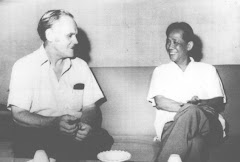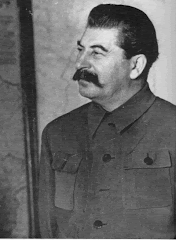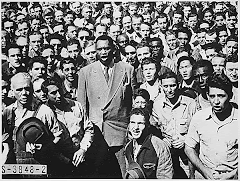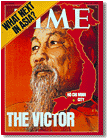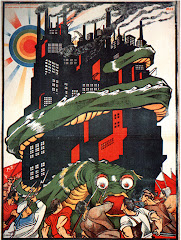POSTCARD FROM TOKYO
Communism Is Alive and Well and Living in Japan
From Time Magazine and CNN
Friday, Jun. 22, 2007 By BRYAN WALSH
 Cute as Hello Kitty, 19-year-old Michiko Suzuki looks like any of the thousands of teens haunting the street fashion stores of Tokyo's youthful Harajuku district. But when the Wako University student takes time off from study sessions dissecting Marx to hit the street, it's usually in order to distribute political literature. To her classmates, the party may be something to which you bring the karaoke machine, but Suzuki knows it's really the revolutionary vanguard of class struggle. That's because Suzuki is a teenage communist.
Cute as Hello Kitty, 19-year-old Michiko Suzuki looks like any of the thousands of teens haunting the street fashion stores of Tokyo's youthful Harajuku district. But when the Wako University student takes time off from study sessions dissecting Marx to hit the street, it's usually in order to distribute political literature. To her classmates, the party may be something to which you bring the karaoke machine, but Suzuki knows it's really the revolutionary vanguard of class struggle. That's because Suzuki is a teenage communist.Bolshevism runs in her family: The daughter and granddaughter of party members, she joined the Japanese Communist Party (JCP) as soon as she turned 18. "I think it's cool to see [fellow members] struggling unyieldingly," says Suzuki, smiling shyly. "I really love that last word."
The idea of a communist party soldiering on in the world's second-largest economy more than 15 years after the collapse of the Soviet Union
may invite comparisons to Japanese soldiers who remained hidden on isolated Pacific islands because nobody told them World War II had ended.But the JCP is far from extinct: It claims some 400,000 members, and earned 7.3% of the vote in the most recent legislative elections, in 2005 — that's 4.36 million voters.
"The JCP is probably the most successful non-ruling communist party in Asia, if not the world," says Lam Peng-er, a research fellow at the National University of Singapore's East Asian Institute.
That success has its roots in the party's long history in Japan. Born in 1922 as the Japanese branch of the Communist International, the international federation of Marxist-Leninist parties created by Moscow, the JCP quickly adapted itself to local conditions. It was one of the few Japanese groups to stand up to the rise of Japanese militarists in the run-up to World War II, and suffered heavily as a result.
"The JCP was the only political party that struggled against the past war of aggression with the sacrifice of members' lives," says Kazuo Shii, the JCP's salaryman-suited chairman. That principled stance earned the respect of many Japanese after the war ended, and the newly legal JCP was allowed to run for election.
But the JCP's early success spooked American occupation officials fearful of Soviet infiltration, and they moved to curtail the party's influence.In the "Red Purge" of 1949, they removed all communists and other left-wingers from official positions in Japan, leaving the LDP to dominate for decades. Still, the JCP formed a reliable leftist opposition bloc with the larger and more mainstream Japanese Socialist Party, steadfastly pacifist and opposed to a security alliance with the U.S.
Of course, communist parties elsewhere in the industrialized world that had followed a similar script nonetheless faded into irrelevance in the 1990s. But the JCP, although weaker than in its heyday, still matters in Japanese politics.
Shii credits the JCP's consistent independence from Moscow for its survival. But the JCP's endurance has more to do with its role in the domestic political arena. The largest parties in Japanese politics lack a clear and cohesive identity, functioning more as loose alliances of interest with few discernible political differences, and they draw support less on ideological bases than through personal networks of patronage built by individual candidates. "It's like Tammany Hall," says Lam. Support for the parties themselves is weak, and getting weaker, as increasingly sophisticated Japanese voters seek meaningful political choice.
The JCP may benefit by virtue of actually standing for something — "the socialist/communist society," according to its manifesto. "The JCP is a boutique party, but it's the only political party in Japan that has a strong grassroots organization," says Lam. "In a way, the communists are probably the most modern political party in Japan."
Despite holding only 18 of the 722 seats in the Diet, the JCP often functions as the only genuine opposition to politics-as-usual in Tokyo. Virtually alone among Japan's parties, the communists have hammered Prime Minister Shinzo Abe and others for backsliding on Japan's role in forcing tens of thousands of Asian women into prostitution during World War II. Communist politicians have repeatedly uncovered damaging financial scandals in government — they're too far removed from power to be enmeshed in Tokyo's endemic corruption. "We are the watchdog, but we go further than that," says Shii. "I think the advance of the JCP will be key to the advance of Japanese politics."
Well, maybe — it may be the most progressive party in Japanese politics, but it still adheres to Marxism. (When I half-seriously ask one college-aged party member whether he reads the classics, he reaches into his backpack and produces Volume 2 of the 13-volume Japanese translation of Das Kapital.) And the JCP's cohesion comes at the expense of flexibility and openness — Leninist discipline still applies, and when the Central Committee has ruled on an issue, members are expected to obey. "That's increasingly out of sync with postmodern Japan," says Lam. "But the fear of the JCP is that if they relent, the party will lose its cohesiveness."
The JCP's performance won't change the outcome of July's legislative elections, which could decide the fate of Abe. The Prime Minister's popularity has dropped to record lows in recent weeks due to public anger over mismanaged pension accounts, and he may be forced to resign if the ruling LDP loses too many seats. Still, most Japanese voters will choose either the LDP or the opposition Democratic Party, however unenthusiastically. But the JCP will pick up protest votes, and maybe more, if young Japanese follow Suzuki's example. "I think my friends and those around me have a lot of difficulty and hardship finding themselves, having any confidence in themselves," says Suzuki. "But as a member of the JCP, I have a wider perspective on my future. I know we have possibility." Who said the war was over?
Discussion of article:
This is an interesting article in that we have been hearing for years that socialism is dead.
Socialist theory along with modern day Marxist parties existed long before there was a socialist Soviet Union... and will continue to exist because their only purpose in existing is to enable working people to create a better world for all of us to live in.
All Marxist parties have responded to "local conditions."
This article continues the often stated lie that Moscow always had its hand in the activities of Communist Parties. Whether speaking of Japan or the Red Finns on Minnesota's Iron Range, these Communists have always responded to the local conditions and problems created by capitalism as they have combined socialist theory and practice in the struggle to create a better world for working people.
One only has to consider the influence that ten socialists sitting in the halls of the United States Congress would have in opposing this dirty war in Iraq and in the struggle for workers' rights to understand how important is the role of the Japanese Communist Party in Japan.
This article continues the lie and further distorts the caricature created by the U.S. big-business dominated media that a Marxist-Leninist Party functions by dictate from the top when nothing could, or should, be further from the truth.
Contrary to the lie peddled by Time Magazine and CNN, all decision making by Marxist-Leninist Communist Parties is made at the grassroots level and those decisions arrived at democratically are then the responsibility of the leadership to guide along as they are implemented... simple as that. Why Time Magazine and CNN have teamed up to continue to distort this truth needs to be questioned and answered.
American workers and students would do well to follow the example from Japan described in this article and start carrying socialist literature in their pockets and backpacks--- reading and studying the Marxist "classics" in helping them to understand how capitalism functions and why socialism provides the only alternative to capitalism.
This article chooses to slander Japanese Communists by comparing them to "hold outs" who didn't know World War II had come to an end. Time Magazine has used this kind of filthy lie and distortion time-and-time again... hence the name "Time" Magazine.
Not long ago, shortly before Gus Hall's death, Time Magazine did a piece on Gus Hall and the Communist Party U.S.A. that resembled the lies, distortions, and caricature of Marxism-Leninism depicted in this story on the Japanese Communist Party while creating the illusion of fair and unbiased reporting when nothing could be further from the truth; truth is an alien concept to the big-business media whether covering issues of health care, the war in Iraq, workers' rights, or socialism.
Same Time Magazine--- different writers, many years apart... same biased, lying, deceitful perspective.
Here is that article:
http://www.time.com/time/magazine/article/0,9171,973782,00.html
Monday, Sep. 09, 1991
Last of The Red-Hot Believers
By Michael Riley
 The comrade's room reeks of the past. Above the desk hangs a portrait of Lenin, a treasured gift from Leonid Brezhnev. On another wall is a tapestry of Karl Marx, a present from fallen East German leader Erich Honecker. Elsewhere sit a replica of Lenin's telephone; a wood sculpture from Fidel Castro; and busts of Marx, Engels and Lenin. Gus Hall, aging chairman of the Communist Party U.S.A., calls his New York City office a "museum of history." But among all these historic mementos, Hall is, unwittingly, the prime exhibit.
The comrade's room reeks of the past. Above the desk hangs a portrait of Lenin, a treasured gift from Leonid Brezhnev. On another wall is a tapestry of Karl Marx, a present from fallen East German leader Erich Honecker. Elsewhere sit a replica of Lenin's telephone; a wood sculpture from Fidel Castro; and busts of Marx, Engels and Lenin. Gus Hall, aging chairman of the Communist Party U.S.A., calls his New York City office a "museum of history." But among all these historic mementos, Hall is, unwittingly, the prime exhibit.The 80-year-old party patriarch is one of the world's last communist stalwarts, an ideological dinosaur rapidly headed for extinction. But you'd never know it to talk to him. Let Mikhail Gorbachev resign as party boss, and let the roll of party defectors grow faster than a meat line in Moscow. Gus Hall still insists that communism is not dead, that socialism is as inevitable as ever, that capitalism will be destroyed. "The problem is not with socialism. The problem is with human error, mistakes of leadership," argues Hall, groping to explain the earthquake in the Soviet Union. "The system of socialism is still the only real, basic solution to the problems of capitalism."
The past two years -- and not just the past two weeks -- have put Hall's beliefs to the test. The Iron Curtain opened, and the Berlin Wall toppled. Eastern Europe gained its freedom, and the Germanys united. Capitalists started selling Big Macs in Pushkin Square. Now come the failed coup, the dismantling of the Soviet Communist Party and the race toward independence and a market economy. While conceding that these events mark a "serious detour," Hall finds solace in this quote: "If current events are negative, then look long range."
Make that long, long, long range. Hall may be the only person who is sanguine about Marxism's future. But that's no mystery to anyone who knows the jovial, square-jawed Minnesotan, whose deliberate step and stolid bearing (6 ft., 210 lbs.) evoke his earlier days as a lumberjack and steelworker. He's a rough-hewn American version of the Soviet bear, who would look equally at home in overcoat and shapka on the Kremlin reviewing stand with Brezhnev (his favorite Soviet) or in a gimmie-cap at a Fourth of July picnic in Des Moines. He mixes an earthy Midwest charm with a trace of Finnish ancestry ("yahs" sprinkle his speech), which makes it difficult to fathom his lingering bad-guy notoriety. But behind the affable grin lie eyes cold and calculating. Perhaps it is this paradox -- the genial great-grandfather and steely communist chieftain rolled into one -- that has made him one of the longest-sitting leaders of a national Communist Party.
Hall learned about the coup while at a family reunion in Minnesota, and then hurried back to New York. Though he calls the action unconstitutional, Hall evinces some sympathy for its plotters. "It was an attempt to deal with real problems, but in a wrong way," he explains. He dislikes Boris Yeltsin ("Now I think he becomes the biggest danger") as well as Mikhail Gorbachev (an "opportunist" who "tends to sit on both sides of the fence"). A hard- liner at heart, Hall blasts both men for leading the Soviet Union down the capitalist road. Once capitalism's failures emerge, he predicts, the Soviets will scurry back to socialism. No wonder critics have dubbed him the "Norman Vincent Peale of the left."
The coup attempt sparked a flash of excitement at party headquarters, which is located across the street from the Chelsea Hotel in downtown Manhattan. About 8:30 a.m. every workday, Hall's chauffeur-driven Oldsmobile (he buys American and uses a cellular phone) pulls up to the curb in front of the eight-story brownstone, where staff members, still harboring paranoia left over from the days when the FBI tapped their lines and read their mail, answer the phone "4994" and dispatch envelopes without the party's name. Once in the building, Hall, a four-time presidential candidate, climbs into a creaky elevator for the slow ride to the top floor and its glass cases of dusty party memorabilia. In his office, he settles into a black recliner behind his desk, on which rests a copy of the People's Weekly World and an American Express appointment calendar.
Since before he started shaving, Hall, whose parents were charter members of the Communist Party U.S.A., has been steeped in the revolution. Born Arvo Kusta Halberg, son of a carpenter in Minnesota's iron range, he went to work after the eighth grade as a lumberjack to help support his family. Long hours in the deep woods at a dollar a day educated him. "Working in lumber camps in those days," he recalls, "would make a communist out of anybody." He joined the party in 1927 and spent several years in the early 1930s at Moscow's Marx- Engels-Lenin Institute. When he returned, the brash youngster started organizing workers and getting in trouble. In the Little Steel Strike in Warren, Ohio, authorities charged him with using explosives, and in Minneapolis they arrested him for inciting a riot. In 1940 he was convicted of fraud and forgery in an election scandal and spent 90 days in jail.
In 1948 Hall and 11 other communists were indicted under the Smith Act on charges of advocating the violent overthrow of the U.S. government. He jumped bail and fled to Mexico, was captured in a border motel, and spent several years in a maximum security cell at Leavenworth, right beside Machine Gun Kelly. Such exploits built a mythic aura around Hall, who, two years after his release in 1957, became general secretary of a party in turmoil. Gone were the halcyon days of 1932 when a communist candidate for President garnered 102,000 votes. Between McCarthy's witch-hunts and Nikita Khrushchev's 1956 denunciation of Stalin, the party was hemorrhaging.
Fewer than 10,000 party members remain (though Hall claims 15,000), and some are fomenting revolt from within. They blast Hall's Stalinesque grip on the party and push for more openness and democratization. Party members' letters, filled with criticism about Hall and his hierarchy, crisscross the country. % "There's a revolt brewing, and there are going to be some walls falling down," predicts party member Conn Hallinan. "Gus has to go. I don't care if the man shows up in love beads and says, 'Everybody do your own thing'; he'd still have to go." Dorothy Healey, a longtime foe who left the party in 1973 but still has pipelines into it, agrees. "It's like that old Lord Acton saying: 'Power corrupts,' " says Healey. "It's very sad because it's not just the Communist Party but the left that has to come to terms with a new reality." Says Hall defensively: "I've always said we'd be a dead party if we didn't have differences."
While Hall's resolute belief in Marxism restricts his vision, it helps explain his ability to retain power. So, too, does his aw-shucks Americanism. He is a smart, if not brilliant, fellow who connects with the common man. Even though he named his golden retriever Yuri (after Andropov), Hall has cultural tastes that are all-American. He guffaws at the hit TV show America's Funniest Home Videos. He reads the Wall Street Journal and Business Week, along with the African Communist. And he raises few complaints from his Yonkers neighbors. (In the 1960s, when he started a huge excavation, neighbors wondered whether Hall knew about an impending Soviet nuclear attack. But it turned out he was digging a garage, not a bomb shelter.)
His wild past is hard to reconcile with a man who paints primitive pictures of woodpeckers for kids, collects art and grows organic vegetables at his son's house on Long Island. During the summer, Hall frequently arrives at the office, his car trunk laden with squash, lettuce, eggplant and potatoes. Last weekend he fought the stress of world events by clearing from the yard trees downed by Hurricane Bob. Elizabeth, his wife of 56 years, applauds him as a good family man. Indeed, how can anyone think ill of Hall when he beams so about cooking pancakes for his four grandchildren and two great-grandchildren, or shares his secret for making tasty beef stew. (It's the apples.)
Is anybody still afraid of Gus Hall? Well, the FBI keeps tabs on him. "This is sort of the last chapter of a long scenario," says Pat Watson, FBI deputy assistant director. But even the feds know the party is over. There's plenty of evidence. The party daily newspaper has become a weekly. Its cable TV show, People Before Profits, has been suspended. Membership has dropped about 25% in the past year.
This last communist, forlorn and nearly forgotten, is more lonely than loathsome. His glory days, when he battled the "old, big lie" that communists were hiding everywhere, hatching plots to overthrow the government, are gone. Today what Hall calls the "new, big lie" -- that the red menace is ready for burial -- is true. Hall, years ago, thought socialism was just around the corner. "But when you get older," he says with customary dexterity, "you have to say there is more than one corner." The only thing lurking around the next corner, however, is the dustheap of history.
After reading these two articles from Time Magazine I have to wonder if the writers and editorial board members didn't share the same caves with Japanese "hold outs" from World War II... they definitely view the world with the same lack of vision and misunderstanding.
I would encourage working people to obtain Gus Hall's last book: Working Class U.S.A., The Power and the Movement. This book is available for a very reasonable price (usually three to four dollars) from internet bookstores.

Time Magazine argues that Gus Hall's "resolute belief in Marxism restricts his vision;" when in fact, Marxist theory and practice restricts the ability of imperialism to continue its barbarism, carnage, wars, exploitation, and racism.
Anyone who takes the time to read Gus Hall's book--- Working Class U.S.A., The Power and the Movement--- will quickly find that Hall's Marxist vision is one of sincerity, openness and honesty aimed at creating a world at peace where people live in harmony with one another and with nature... concepts Time Magazine and the big-business media don't want us to understand.






